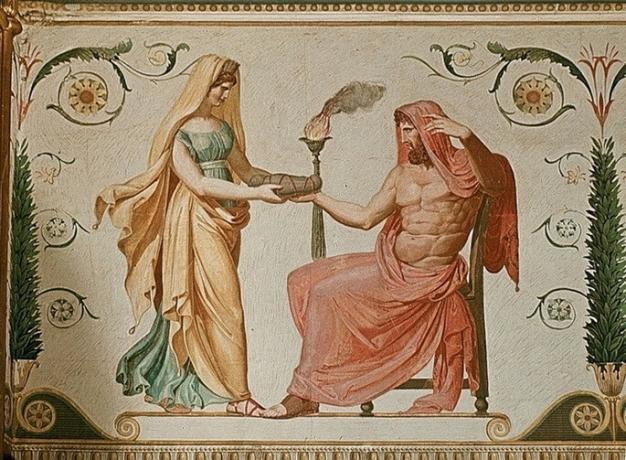Mythology is a belief system composed of a series of narratives called a myth. These stories seek to explain everything that exists and is important to a society.
Myths are stories that explain the existence of various elements of nature, as well as teach about human behavior. These narratives and legends make up the collective imagination of a given people.
They form an oral tradition, their stories are told from generation to generation. These fabulous accounts become the history of things and a common belief shared by a group of people.
What is a myth?
The word myth has its origin in the Greek term mythos which means "narrative". Thus, mythology can be understood as an oral knowledge that aims to explain the world.
The myth is an orally told story composed of fantastic beings: heroes, gods and mythological creatures. These are full of teachings and form a kind of knowledge.
Read more at: What is a myth?
The meaning of myth today
Throughout history, the term myth came to designate events or characters that seem to break logic. When used for people, the word myth takes on the meaning of identifying that person to a hero, something that is above ordinary people.
However, when used to define events from the past, myths mean something possibly false, unconfirmed, but some people believe.
How many mythologies are there?
It is not possible to pinpoint the exact amount of myths or mythologies that exist. Different peoples built different and complex mythological systems.
However, all mythologies have a common characteristic: to serve as an explanation for the emergence of the world, for the elements of nature and the relationships between human beings.
The main examples are:
- Greek mythology
- Roman Mythology
- Egyptian Mythology
- Norse mythology
- Phoenician Mythology
- Yoruba Mythology
- Zulu Mythology
- Celtic Mythology
- Mayan Mythology
- Inca Mythology
- Japanese Mythology
- Guarani Mythology
Many societies that had a mythical conscience were extinguished, others suffered a process of transformation in which myths were replaced by other knowledge: philosophy and religion.
Examples of Myths
In Greek mythology, the Myth of Cronus explains the emergence of the world. According to the myth, the gods and human beings would be children of time (Kronos), but he was in the habit of eating them out of fear that someone would take his throne.
One day, his wife, the goddess Rhea, tricks him with stones wrapped in cloth and manages to free a child, Zeus. Zeus grows up, defeats Cronos and starts to rule and organize the world as it exists, assuming himself as the god of the gods.

Other important myths that have a legacy in the construction of Western culture are:
- The Myth of Narcissus
- Myth of Orpheus and Eurydice
- Oedipus King
- the jellyfish
- Pandora's box
- Perseus
Mythological beings, gods, animals, plants, human feelings and whatever else is relevant to a particular people intertwine in a web of stories that explain everything that exists in the world.
These explanations are simple to understand, as they use images, metaphors and a narrative with a beginning, middle and end.
Even so, Greek mythology tends to be one of the most complex, composed of a series of gods and beings that relate to and make sense of everything that exists. Some Greek gods are:
- aphrodite - goddess of beauty and love
- Apollo - God of light
- Ares - God of War
- Artemis - moon goddess
- Athena - wisdom goddess
- Demeter - god of the fertile land
- Dionysus - god of party, wine and pleasure
- Eros - God of love
- Hades - Underworld god
- Hermes - god of communications and travel
- Ivy - goddess of heaven, motherhood and marriage
- hestia - fire goddess
- persephone - queen of the underworld
- Poseidon - god of the seas
- Zeus - God of gods
mythological beings
Each mythology has its own beings. They have characteristics that human and superhuman, mixed with elements of nature, build a narrative that helps to understand the culture of a people.
Some examples of mythological beings are:
- Medusa - In Greek mythology, Medusa was a female figure with snakes in place of her hair and capable of turning into stone anyone who looked directly into her eyes.
- Minotaur - Creature with a man's body, head and tail of a bull. He was responsible for guarding the labyrinth and protecting the entrance to the city of Minos, Greece.
- Cerberus - The three-headed dog that guarded the entrance to the underworld.
- Hydra - Water monster similar to a multi-headed dragon. She lived in the swamp of Lerna and was defeated by the hero Hercules.
- Kraken - Giant squid from Norse mythology, attacked ships that dared to navigate the North Atlantic.
- Elf - Creatures from Norse and Celtic mythologies, responsible for guarding the forests, also possessed healing powers.
- Curupira - Protector of the forest in Brazilian mythology, its feet turned backwards form footprints that confuse hunters and those who try to chase it.
Interested in mythology? These texts can help you:
- Odin
- Roman gods
- Gods of Olympus
- Greek gods
- greek goddesses
- Myths and legends from Brazil and the world

